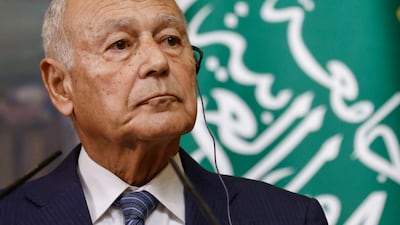Arab League foreign ministers who met in Cairo on Wednesday called for the immediate halt of Israel's bombardment of the Gaza Strip.
And they warned that the violence that has killed thousands in Israel and Gaza could spiral out of control.
In a statement after an emergency meeting requested by the Palestinians, the ministers also stressed "the condemnation of the killing or targeting of civilians from both sides, along with all actions that breach international and humanitarian laws.
They called on both sides to protect civilians and release all hostages, civilians and prisoners of war.
The statement also called for the immediate lifting of the "siege" of Gaza, allowing humanitarian supplies, food and fuel into the coastal enclave.
They said Israel must rescind its decision to halt power and water supplies to the territory's 2.3 million residents.
The statement echoed in part comments made by Arab League chief Ahmed Aboul Gheit at the meeting, in which he expressed his “total and outright rejection” of harming civilians on both sides.
Mr Aboul Gheit also strongly condemned Israel's relentless bombardment of the Gaza Strip in retaliation for the surprise deadly incursion by militants into Israel last weekend, but used equally strong language to renounce violence against civilians.
“I reject completely and outright any violence against civilians,” he told the ministers.
“Killing and terrorising non-combatants is unacceptable as a means to realise a noble political aim like independence.”
Militants from Palestinian group Hamas, which rules Gaza, invaded Israel on October 7 and killed more than 1,200 civilians, including children, and took scores hostage. The captives included civilians.
“We fear consequences of a major magnitude … the revenge that is being exacted on Gaza is unacceptable, and killing civilians and terrorising people is not acceptable as a method for self-liberation,” said Mr Aboul Gheit.
The current escalation was due to the “apartheid” that Palestinians experience daily and that the “government of occupation oppresses the Palestinians and allowed for the language of hatred to take over,” he added.
Palestinian Foreign Minister Riyad Al Maliki also addressed the Arab ministers.
“What is happening in Gaza is genocide and population displacement,” he said.
He demanded “an end to the aggression and ensuring the entry of basic needs” for Gaza's people.
“Our people are facing a war of extermination by Israel.”
Israel's artillery shelling and air strikes in Gaza, the intensity of which are unprecedented, have killed more than 1,000 Palestinians so far in retaliation for Hamas's incursion.
The October 7 attack is widely recognised as Israel's bloodiest day since Egyptian and Syrian troops launched a surprise offensive against Israel 50 years ago.
The Arab foreign ministers' meeting was held amid an outpouring of sympathy for Israel in the West, as well as strong condemnation of Hamas and its allies for killing and taking civilians hostage.
Countries such as Egypt and Jordan – both of which have peace treaties with Israel – have called for an end to the violence and repeated calls for a two-state solution to the Palestinian-Israeli conflict.
They have blamed the policies of Israel's right-wing government for igniting the latest violence.
"The Arab foreign ministers emphasised that the only way to secure the region's security and stability is to realise a comprehensive, just and permanent peace that meets all the legitimate rights of the Palestinians," said their statement.
Of these rights, it continued, the most important is to establish an independent Palestinian state on the West Bank and Gaza Strip, with East Jerusalem as its capital.
Peace talks between the Palestinians and Israel have been stagnant for years.
"The absence of genuine political prospects to achieve a just and comprehensive peace will only deepen despair, fuel the conflict, strengthen extremism and increase tension and violence," said the statement.

